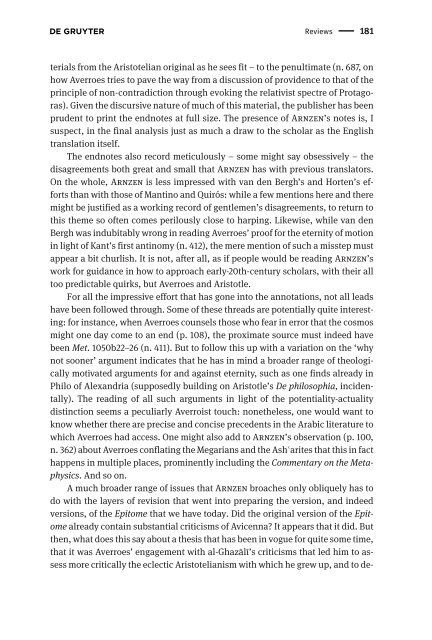0021-1818_islam_98-1-2-i-259
0021-1818_islam_98-1-2-i-259
0021-1818_islam_98-1-2-i-259
You also want an ePaper? Increase the reach of your titles
YUMPU automatically turns print PDFs into web optimized ePapers that Google loves.
Reviews 181<br />
terials from the Aristotelian original as he sees fit – to the penultimate (n. 687, on<br />
how Averroes tries to pave the way from a discussion of providence to that of the<br />
principle of non-contradiction through evoking the relativist spectre of Protagoras).<br />
Given the discursive nature of much of this material, the publisher has been<br />
prudent to print the endnotes at full size. The presence of Arnzen’s notes is, I<br />
suspect, in the final analysis just as much a draw to the scholar as the English<br />
translation itself.<br />
The endnotes also record meticulously – some might say obsessively – the<br />
disagreements both great and small that Arnzen has with previous translators.<br />
On the whole, Arnzen is less impressed with van den Bergh’s and Horten’s efforts<br />
than with those of Mantino and Quirós: while a few mentions here and there<br />
might be justified as a working record of gentlemen’s disagreements, to return to<br />
this theme so often comes perilously close to harping. Likewise, while van den<br />
Bergh was indubitably wrong in reading Averroes’ proof for the eternity of motion<br />
in light of Kant’s first antinomy (n. 412), the mere mention of such a misstep must<br />
appear a bit churlish. It is not, after all, as if people would be reading Arnzen’s<br />
work for guidance in how to approach early-20th-century scholars, with their all<br />
too predictable quirks, but Averroes and Aristotle.<br />
For all the impressive effort that has gone into the annotations, not all leads<br />
have been followed through. Some of these threads are potentially quite interesting:<br />
for instance, when Averroes counsels those who fear in error that the cosmos<br />
might one day come to an end (p. 108), the proximate source must indeed have<br />
been Met. 1050b22–26 (n. 411). But to follow this up with a variation on the ‘why<br />
not sooner’ argument indicates that he has in mind a broader range of theologically<br />
motivated arguments for and against eternity, such as one finds already in<br />
Philo of Alexandria (supposedly building on Aristotle’s De philosophia, incidentally).<br />
The reading of all such arguments in light of the potentiality-actuality<br />
distinction seems a peculiarly Averroist touch: nonetheless, one would want to<br />
know whether there are precise and concise precedents in the Arabic literature to<br />
which Averroes had access. One might also add to Arnzen’s observation (p. 100,<br />
n. 362) about Averroes conflating the Megarians and the Ash^arites that this in fact<br />
happens in multiple places, prominently including the Commentary on the Metaphysics.<br />
And so on.<br />
A much broader range of issues that Arnzen broaches only obliquely has to<br />
do with the layers of revision that went into preparing the version, and indeed<br />
versions, of the Epitome that we have today. Did the original version of the Epitome<br />
already contain substantial criticisms of Avicenna? It appears that it did. But<br />
then, what does this say about a thesis that has been in vogue for quite some time,<br />
that it was Averroes’ engagement with al-Ghazal\’s criticisms that led him to assess<br />
more critically the eclectic Aristotelianism with which he grew up, and to de-


